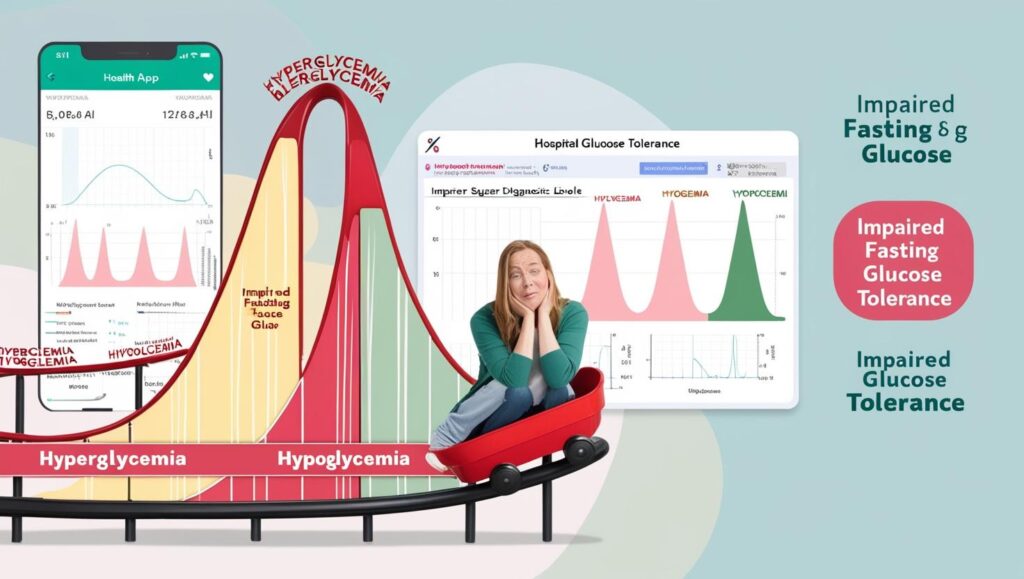- Sudden blurred vision and sweating?
- Feeling irritable and unfocused for no reason?
- Shaky hands and dizziness even without hunger?
Many dismiss these symptoms as simple fatigue.
But they could indicate hypoglycemia—and potentially the early stage of pre-diabetes. Yes, it might already be starting.
What Is Hypoglycemia?
Hypoglycemia refers to a sudden drop in blood sugar levels.
Normal fasting glucose is between 70–99 mg/dL, and under 140 mg/dL two hours after eating.
But in hypoglycemia, blood sugar falls below 70 mg/dL, which can lead to loss of consciousness or shock.
🔹 Common Symptoms of Hypoglycemia
- Sudden fatigue or energy crash
- Shaking hands, cold sweats, dizziness
- Feeling anxious or restless
- Heart palpitations or irregular heartbeat
- Poor focus and blurred vision

How Is Hypoglycemia Related to Pre-Diabetes?
Many think diabetes only occurs when blood sugar is high.
However, when blood sugar regulation begins to fail, your body may oscillate between highs and lows.
This “blood sugar rollercoaster” is a major sign of pre-diabetes (impaired fasting glucose or glucose tolerance).
🔹 The Risk of Pre-Diabetes
- 1 in 3 Korean adults has pre-diabetes (2023, Korean Diabetes Association)
- 30% develop diabetes within 5 years
- There are almost no symptoms in early stages
How to Respond When Blood Sugar Drops
Don’t ignore or endure it!
✅ Emergency Response for Hypoglycemia
– Call emergency services if unconscious
– Quickly consume sugar: candy, juice, or honey
– 15g of fast-acting carbohydrates (e.g., a glass of sugar water)
– Reassess after 10–15 minutes
– If no improvement, consume another 15g of carbs
Am I At Risk Now?
📋 Early Signs Your Body Might Be Sending
- Trembling hands or feet without reason
- Mid-morning fatigue
- Feeling anxious or unfocused when hungry
- Dizziness when skipping breakfast
- Excessive drowsiness after meals
Recommended Foods & Stable Blood Sugar Meal Plan
| Category | Recommended Foods | Reason |
|---|---|---|
| Quick Sugar Refill | Glucose tablets, honey, fruit juice | Fast-absorbing simple sugars |
| Stable Blood Sugar | Brown rice, sweet potato, oats | Slow-releasing complex carbs |
| Protein Support | Boiled eggs, nuts | Longer satiety, prevents sugar spikes |
| Foods to Avoid | White rice, sugary drinks, snacks | Cause blood sugar fluctuations |
| 🥗 Sample Daily Meal Plan | ||
| Breakfast | Oatmeal + boiled egg + banana | |
| Lunch | Brown rice + chicken breast + stir-fried vegetables | |
| Dinner | Oatmeal rice + grilled salmon + broccoli | |
| Snack | Almonds, apple, unsweetened yogurt | |
📊 Hypoglycemia Statistics in Korea (2023, KDA)
- 28% of people in their 30s are in pre-diabetic stage
- Over 36% in their 40s–50s
- 35% of diabetic patients experience hypoglycemia episodes
- 1 in 5 clinic visits are due to hypoglycemic symptoms
Frequently Asked Questions
Q1: Is hypoglycemia only for diabetics?
A: No. Anyone can experience it due to diet, overexercise, or stress.
Q2: Can intermittent fasting cause hypoglycemia?
A: Yes, especially when skipping breakfast or fasting too long.
Q3: Is sugary food always good during hypoglycemia?
A: It’s useful in emergencies, but overconsumption can destabilize long-term blood sugar.
Q4: Is it okay to exercise during hypoglycemia?
A: No. First stabilize your blood sugar, then exercise.
Q5: Does pre-diabetes always lead to diabetes?
A: Not always, but over 30% progress within 5 years—prevention is key.
Summary
Those sudden warning signs when your sugar drops—don’t take them lightly.
Your body is always sending signals.
Start listening and taking care today. Blood sugar control starts with prevention.
From meals to sleep and stress, small actions can bring stability and vitality to your day.
Fatigue and depression might be linked to hormonal imbalance: Feeling Constantly Depressed and Tired?
